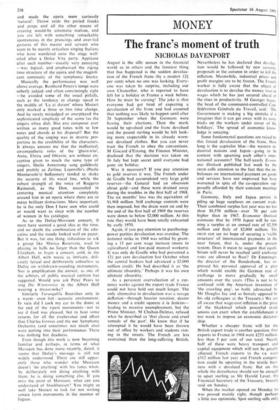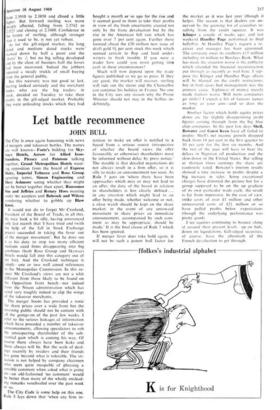MONEY The franc's moment of truth
NICHOLAS DAVENPORT
August is the silly season in the financial world as- in others and the funniest thing that has happened is the sudden devalua- tion of the French franc (by a modest 12+ per cent) when no one was looking. Every- one was taken by surprise, including our own Chancellor, who is reported to have left for a holiday in France a week before. How he must be cursing! The joke is that everyone had got tired of expecting a devaluation of the franc and had assumed that nothing was likely to happen until after 28 September when the Germans were having their elections. Then the mark would be upvalued and the franc devalued and the pound sterling would be left look- ing more respectable in its already worn- out devalued clothes. But you can never trust the French to obey the conventions. M Giscard d'Estaing, the Finance Minister, disclosed that the decision was taken on 16 July but kept secret until everyone had gone on holiday.
Was it necessary? If you pay attention to gold reserves it was. The French under de Gaulle had accumulated very large gold reserves—the General had an obsession about gold—and these were drained away during the troubles in the first half of 1968. The six months' loss was the equivalent of $1,908 million. Stiff exchange controls were then imposed, but the drain went on and by the end of the first half of 1969 the reserves were down to below $2,000 million. At this rate they would have been totally exhausted by early 1970.
Again, if you pay attention to purchasing- power parities devaluation was overdue. The national strike in 1968 was settled by grant- ing a 15 per cent wage increase (more to agricultural and low-paid manual workers). It was only de Gaulle who had prevented a 12+ per cent devaluation last October when the central bankers had advanced a $2,000 million credit. He had described it as 'the ultimate absurdity.' Perhaps it was his own ultimate absurdity.
As a persistent overvaluation of a cur- rency works against the export trade France could not have held out much longer. The only alternative to devaluation was a savage deflation—through heavier taxation, dearer money and a credit squeeze a la Jenkins— leading to massive unemployment, but the Prime Minister, M Chaban-Delmas, refused what he described as 'that classic and cruel remedy of the past'. He knew that if he attempted it he would have been thrown out of office by workers and students riot- ing in the streets. The French are less restrained than the long-suffering British.
Nevertheless he has declared that devalua- tion would be followed by new austerity proposals in the autumn in order to kill the inflation. Meanwhile, industrial prices and profit margins are to be frozen. The French worker is fully aware that the object of devaluation is to devalue the money rises in wages which he has just secured ahead of the rises in productivity. M Georges Seguy. the head of the communist-controlled Con- federation Generale du Travail, said: 'The Government is making a big mistake if it imagines that it can get away with its nasty tricks on the workers under cover of the holidays'. The spread of economic know- ledge is amazing.
Some fundamental questions are raised by this forced devaluation of the franc. How long is the capitalist bloc—the western in- dustrial nations and Japan—going to be content with upsetting each other's inter- national accounts? The half-yearly Econo- mic Outlook published last week by the OECD calls attention to the fact that the im- balances on international payment on goods and services have not improved but have worsened in spite of the co-operation sup- posedly afforded by their constant meetings in Paris.
Germany, Italy and Japan persist in piling up huge surpluses on current trade. Their combined surplus last year was no less than $6,570 million—over 70 per cent higher than in 1967. Economic Outlook estimates that by 1970 Japan will be run- ning a surplus at an annual rate of $2,500 million and Italy of $2,000 million. The OECD can see no hope of securing a 'viable structure' of international payments in the near future, that is, under the present system. Does it mean to suggest that equili- brium will never be reached until exchange rates are allowed to float? Dr Emminger. the director of the Bundesbank, has ex- pressed his personal approval of a plan which would enable the German rate of exchange to move gradually by small amounts over the years. (This is not to be confused with the American invention of 'the crawling peg', so hotly advocated by Mr Douglas Jay and so fiercely opposed by
his old colleagues at the Treasury.) We are all aware that wage-cost inflation is the price of the blackmail which powerful trade unions can exert when the establishment is too weak to impose an economic dictator- ship.
Whether a cheaper franc will hit the British export trade is another question. Our exports to France in 1968 were £253 million.
less than 5 per cent of our total. Nearly half of these were heavy transport and capital equipment which will not be greatly
affected. French exports to the UK were £312 million last year and French competi-
tion could be upsetting in the textile busi- ness with a devalued franc. But on the whole the disturbance should not be enough to upset sterling as Mr Harold Lever, the Financial Secretary of the Treasury, bravely said on Sunday.
When the market opened on Monday he was proved mainly right, though perhaps a little too optimistic. Spot sterling sells only
from 2.3910 to 2.3850 and closed a little higher. But forward sterling was more dumb, affected, falling from 2.3742 to 13525 and closing at 2.3488. Confidence in the future of sterling, although stronger than it used to be, is not yet robust.
As for the gilt-edged market, the long dated and medium dated stocks were' marked down by half a point and the
.shorts' by but no big selling developed and by the close of business half the losses had been recovered. Indeed the jobbers reported a steady trickle of small buying from the general public.
But this recovery was too good to last. sterling looked unsteady and the merchant sulks, who are the big traders in .took, decided on Tuesday to take their ,rofits in the gilt-edged market. Probably hey were unloading stocks which they had
bought a month or so ago for the rise and it seemed good to them to take their profits in view of the fresh uncertainty created not only by the franc devaluation but by the rise in the American bill rate which has gone over 7 per cent again. Further there loomed ahead the £20 million new issue of draft gold 91 per cent stock this week which seemed certain to flop and land under- writers in fresh trouble. If you were a trader how could you resist getting into cash in these circumstances?
Much will now depend upon the trade figures published as we go to press. If they are good, the market will recover. sterling will ride out the storm and the Chancellor can continue his holiday in France. No one in the City sees any reason why the Prime Minister should not stay in the Scillies in- definitely.



































 Previous page
Previous page